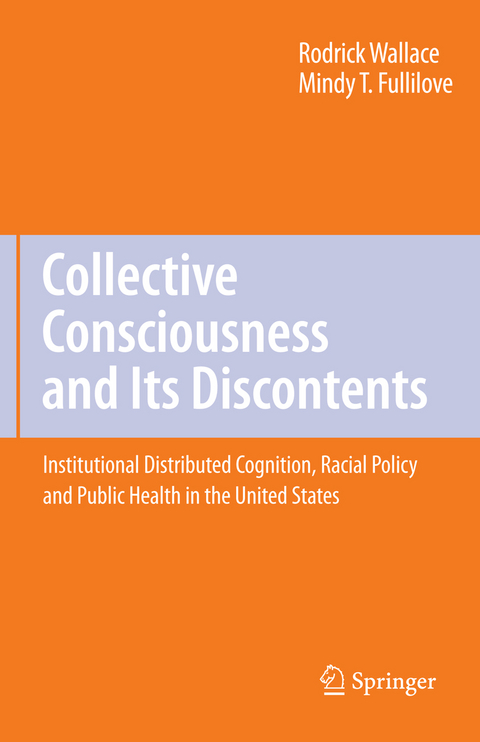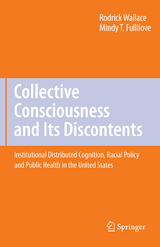Collective Consciousness and Its Discontents:
Institutional distributed cognition, racial policy, and public health in the United States
Seiten
2007
|
2008 ed.
Springer-Verlag New York Inc.
978-0-387-76764-2 (ISBN)
Springer-Verlag New York Inc.
978-0-387-76764-2 (ISBN)
An earlier book by the author entitled "Consciousness: A Mathematical Treatment of the Global Neuronal Workspace Model", introduced a formal information-theoretic approach to individual consciousness. This book takes a more formal 'groupoid' perspective to its predecessor and generalizes the results presented in that earlier book.
An earlier book by Rodrick Wallace entitled Consciousness: A Mathematical Treatment of the Global Neuronal Workspace Model, introduced a formal information-theoretic approach to individual consciousness implementing approaches developed previously by the cognitive scientist Bernard Baars and the philosopher Fred Dretske.
This book takes a more formal 'groupoid' perspective and generalizes the results of that book to processes of 'distributed cognition' characteristic of large institutions that can entertain several, sometimes many, simultaneous 'global workspaces' which must compete for resources while communicating and cooperating.
Equivalence classes of 'states' produce a network of language-analogs characterizing interacting cognitive modules which entertain multiple workspaces. Equivalence classes of these language-analogs produce dynamical manifolds describing temporal processes carried out by multiple-workspace institutions.
An earlier book by Rodrick Wallace entitled Consciousness: A Mathematical Treatment of the Global Neuronal Workspace Model, introduced a formal information-theoretic approach to individual consciousness implementing approaches developed previously by the cognitive scientist Bernard Baars and the philosopher Fred Dretske.
This book takes a more formal 'groupoid' perspective and generalizes the results of that book to processes of 'distributed cognition' characteristic of large institutions that can entertain several, sometimes many, simultaneous 'global workspaces' which must compete for resources while communicating and cooperating.
Equivalence classes of 'states' produce a network of language-analogs characterizing interacting cognitive modules which entertain multiple workspaces. Equivalence classes of these language-analogs produce dynamical manifolds describing temporal processes carried out by multiple-workspace institutions.
Consciousness And Distributed Cognition.- Formal Theory.- Pathologies Of Collective Consciousness.- Disease And Collective Consciousness.- The Failure Of Aids Control And Treatment In The Us.- Final Remarks.- Mathematical appendix.- References.
| Zusatzinfo | 14 Illustrations, black and white; X, 206 p. 14 illus. |
|---|---|
| Verlagsort | New York, NY |
| Sprache | englisch |
| Maße | 155 x 235 mm |
| Themenwelt | Geisteswissenschaften ► Psychologie ► Arbeits- und Organisationspsychologie |
| Geisteswissenschaften ► Psychologie ► Sozialpsychologie | |
| Geisteswissenschaften ► Psychologie ► Verhaltenstherapie | |
| Mathematik / Informatik ► Informatik | |
| Medizin / Pharmazie ► Gesundheitswesen | |
| Studium ► Querschnittsbereiche ► Epidemiologie / Med. Biometrie | |
| Studium ► Querschnittsbereiche ► Prävention / Gesundheitsförderung | |
| Technik ► Medizintechnik | |
| ISBN-10 | 0-387-76764-9 / 0387767649 |
| ISBN-13 | 978-0-387-76764-2 / 9780387767642 |
| Zustand | Neuware |
| Informationen gemäß Produktsicherheitsverordnung (GPSR) | |
| Haben Sie eine Frage zum Produkt? |
Mehr entdecken
aus dem Bereich
aus dem Bereich
ein überfälliges Gespräch zu einer Pandemie, die nicht die letzte …
Buch | Hardcover (2024)
Ullstein Buchverlage
CHF 34,95




